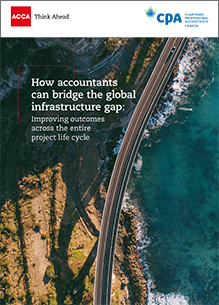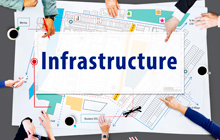Accounting profession must help close global infrastructure gap

The accounting profession worldwide has a role to play, says ACCA, CPA Canada
TORONTO, August 22, 2019 – Professional accountants should be given greater responsibilities if countries around the world are going to close the global infrastructure gap. But what can the accounting profession do to put accountants among the key decision makers when it comes to infrastructure planning?
The term "global infrastructure gap" identifies the difference between infrastructure investment needed and the resources available to meet that need. According to analysis from Global Infrastructure Hub, in 2018 alone, the investment gap grew by over $400 billion and it is set to grow to a staggering $14 trillion by 2040. As detailed in part one and part two of this three-part series on accounting and infrastructure, which is based on How accountants can bridge the global infrastructure gap, published by the Chartered Professional Accountants of Canada (CPA Canada) and the Association of Chartered Certified Accountants (ACCA), we highlighted the unique and traditional skills of today's professional accountants, which are ideally suited for monitoring and providing oversight to infrastructure projects to ensure that they are achieving their long term goals.
The authors of the report recommend that the accounting profession should implement proper monitoring and oversight for all projects, and advocate embedding accountants in the professional teams delivering infrastructure by highlighting their expertise of risk management. It also recommended that professional bodies should act as facilitators of the knowledge transfer between the public and private sectors through thought leadership events and roundtables. “The professional accountant, with an understanding of life-cycle considerations and with professional frameworks for sound professional judgement and ethics, is well-equipped to coordinate such collaboration,” the report asserts.
CPA Canada and ACCA documented how the public-private relationship is evolving and that getting the terms of this relationship correct will be critical for the successful provision of social and economic infrastructure in the future. The report explains that the professional team delivering an infrastructure project will be aided by an accountant’s expertise of risk management. “Although the size and nature of the public sector suggests that it is better placed to bear risk, skilled finance professionals will seek to balance the allocation of risks to the private parties such that they maintain the incentive to perform contractual obligations to a high quality standard.”
 |
Download How accountants can bridge the global infrastructure gap: Improving outcomes across the entire project life cycle. |
Professional accountants exhibit strength in terms of applying professional judgment and ethics. “We have frameworks that that we can hone in on to promote the use of evidence-based reliance on unbiased information and to see it is done compliantly, reliably, and with consistency,” said Davinder Valeri, the Toronto-based director of strategy risk and performance for CPA Canada, and the report’s co-author, in an interview.
“We definitely pride ourselves in how we act and behave in an ethical nature. I think it’s in our DNA as accountants to be able to do the right thing,” says Valeri. She notes how, for example, CPA Canada has been very supportive and committed to global efforts to combat money laundering, with whistleblowing being an important component of that initiative.
Ethical considerations that the accounting professional can offer an infrastructure project team include answers to the following questions: “How can we make sure this project is meeting the objectives that have been set out by the government? Are there processes in place? Is there governance? Are there controls? Is there rigour? Is there an opportunity to report, to monitor? What is the value that we’re creating?
“These are areas where an accountant gets engaged — that thinking that they bring to the table around risk is very holistic,” she emphasizes.
Infrastructure is critical for economic and social development around the world
Forces such as demographics, rising cyberthreats, urbanization and climate change are all increasing the global demand for quality infrastructure. From the transportation networks that enable people and goods to move around safely and effectively, to the utility systems providing power and services essential to survival — these systems rely heavily on investments and funding. Around the world, national, regional and local governments are making investment decisions to serve the public and play a critical role in building and maintaining important infrastructure.
However, there are impediments to successfully building infrastructure. Respondents from a survey of a total of 3,611 CPA Canada members and ACCA members globally identified three major barriers to meeting the infrastructure needs of their respective countries. These were:
- Lack of political leadership (52 per cent);
- Lack of funding (49 per cent); and
- Planning and regulatory barriers (40 per cent).
The ACCA’s head of public sector policy, Alex Metcalfe, says: “Solving the infrastructure puzzle is crucial to achieving a better more sustainable future for all, as it tackles global issues such as inequality, poverty and climate change. The accountant is well-placed to tackle many of the major challenges humanity faces in the 21st century and beyond.”
This concludes our three-part series on the accounting profession and the global infrastructure gap, by Jeff Buckstein, CPA, CGA. We invite you to read part one, "How accountants can help bridge the global infrastructure gap," and part two, "Accountants are critical to infrastructure financing decisions, says ACCA, CPA Canada."








(0) Comments